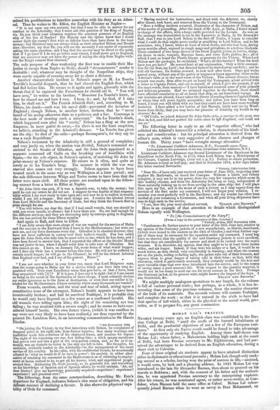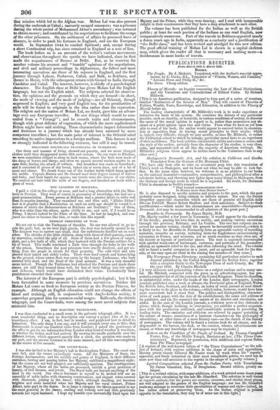MOHAN LAL'S TRAVELS.
NEARLY twenty years ago, an English class was established in the Per- sian College at Delhi, " amid the scoffs of the learned inhabitants of Delhi, and the prudential objections of not a few of the European resi- dents." At first only six Native youth could be found to take advantage of the opportunity of studying English. Among these half-dozen was Mohan Lal ; whose father, a Mahometan holding high rank at the court of Delhi, had been Persian secretary to Mr: Elphinstone, and had per- ceived the advantages to be derived from an English education, during a short visit to Calcutta.
Four of these original six students appear to have attained distinction either in diplomatic or educational pursuits ; Mohan Lal, though only rank- ing second as a scholar, having won the prize of success in life,—assisted, it would seem, by luck and a pleasing address. In 1831 Mohan Lal was introduced to the late Sir Alexander Burnes, then about to proceed on his travels to Bokbara ; and, with the consent of his father and the authori- ties, lie was appointed Persian secretary to the enterprising explorer. After his return, he was nominated agent, or rather news-writer, at Can- dahar, when Masson held the same office at Cabul. Mohan Lat subse- quently joined Burnes when he went as envoy to Bost Mohammed, on
that mission which led to the Afghan war. Mohan Lal was also present during the outbreak at Cabal ; narrowly escaped massacre; was a prisoner daring the whole period of Mohammed Akbar's ascendancy; was tortured to obtain money; and contributed by his negotiations to facilitate the escape Of the other prisoners. On the settlement of affairs he procured leave of absence, in order to push his fortunes in England, and see the European world. In September 1844 he reached Spithead ; and, except during a short Continental trip, has since remained in England as a sort of lion.
The book before us is an account of the writer's various movements and observations throughout the epochs we have indicated, since he first made the acquaintance of Burnes at Delhi. But, as he reserves for another volume his account and "humble" opinions of the negotiations, and civil and military proceedings in Afghanistan, the fullest and most interesting narratives are those of his sojourn in England, and the first journey through Lahore, Peshawar, Cabul, and Balk, to Bokhara, and thence to Herat, with the subsequent return with Gerard to India through Candahar and Cabul. The interest, however, is chiefly of a psychological character. The English class at Delhi has given Mohan Lal the English language, but not the English mind. The subjects selected for observa- tion, the opinions and the grounds on which they are formed—in short, the mode of viewing and the mode of judging—are all Oriental, though expressed in English; and very good English too, for the peculiarities of style will be found to originate in the idea rather than the expression. The religion and the nation of Mohan Lal, no doubt, gave him an advan- tage over any European traveller. He saw things which would be con- cealed from a " Ferangi" ; and he records traits and circumstances, though with great delicacy of expression, of which the more sophisticated Briton might have said nothing. These characteristics impart information and freshness to a journey which has already been narrated by more competent travellers ; but the main point of interest is the Oriental mind recording its native impressions in a foreign medium. This feature is not so strongly indicated in the following extracts, but still it may be traced.
DISGUISED POLITICA LS TRAVELLING IN TURKISTAN.
Onr dress and maimer of living showed our poverty, and we never changed clothes until they disappeared under filth and vermin. On our route to Khulum, we were sometimes obliged to sleep in dark rooms, where the beds were made of the dung of horses and sheep; and often we passed several restless nights in an open field, fearing the attack of robbers. Our breakfast was made on horseback and it consisted of pieces of dry bread, baked six or seven days, and of a bit of meat and cheese. We drunk water out of the leather bottle which hung against the saddle. Captain Burnes and Mr. Gerard used their fingers instead of knives and forks, and their hands for spoons; our towels were the sleeves of our shirts. We combed our hair with the nails of our fingers, and brushed our teeth with a piece of wood.
THE LEARNED OF BOKHARA.
I paid a visit to the college at noon, and had a long altercation with the Man- lavis in Persian. They were of course in possession of knowledge, but had not a good pronunciation. Every person at Bokhara had a greater desire to write well than to acqufrolearning. 'They examined me, and then said, " Allah° Akbar ! how is it possible that a Kashmerian at such an early age should be versed in a science of which the Mohammedans at Bokhara are destitute ! " One of them, who was older than the others, spoke civilly to me, and said, if I would be an Uzbeg, I should indeed be the Prato of the time. At last he laughed, and con- jured me either to become like him, or make him like myself.
PERSIAN PRISONERS OF WAR.
We set out to visit the Tnrkmans of Sarakhs. No one was allowed to go in- side the gaol; but, as we were high guests, the door was instantly opened to us. The dungeon was so narrow and small, that the unfortunate families sat on each ether. The shrieks of the little children, along with those of their parents, caused by starvation, excited the pity of all. Some of them had a few .pieces of carpet, cloth, and a few balls of silk, which they bartered with the Persian soldiers for a bit of bread. This traffic continued a little time through the holes in the walls of the prison. Sometimes the poor prisoners were cruelly deceived, and got no- thing from the people in return for their property. The cold wind and rain pierced their naked and sickly bodies. There were dead camels and horses lying on the ground, whose rotten flesh was eaten by the hungry Tarkruans; who were covered with mud, and the blood of the dead animals. It was a very dreadful scene indeed. Though the Turkmans had attacked the Persians and made them slaves, yet still they treated them well, for fear of their falling into low spirits and sickness, which would have diminished their value. Undoubtedly their punishment exceeded their crime.
The interest of the European part is strictly psychological; but it has been forestalled in some measure by previous narratives. Neither did Mohan Lal come so fresh to European society as the Persian Princes, for example. Although an English education could not change the effects of blood and training, still, in conjunction with Anglo-Indian society, it somewhat prepared him for common social usages. Railroads, the electric telegraph, and the Court-balls, were among the more novel subjects that attracted him.
THE ELECTRIC TELEGRAPH.
I was then conducted to a small room in the galvanic telegraph office. It is a most wonderful thing, and no description can convey a proper idea of its ex- traordinary effect. I am, in fact, lost in wonder, and perplexed how to detail its formation. The only thing I can say, and it will astonish every one, is this: that Portsmouth is about one hundred miles from London; I asked the gentleman of the office to get for me information from London what kind of weather it was there, Or whether the Indian mail had arrived. By moving the needle gradually over the different letters, which appeared exactly like a clock, the question was made on my part, and the answer returned in the same manner, and all this was completed m the course of five seconds.
THE COURT-BALL.
I was also invited to her Majesty's ball in Buckingham Palace. The court was very full, and the rooms exceedingly warm. All the Ministers of State, the Foreign Ambassadors, and the nobility and gentry of England, in their different °dames, bowing and passing before her Majesty, exhibited a magnificent sight: but the rooms are not well adapted, nor sufficiently spacious. The drawingrooms of her Majesty, where all the ladies are presented, exhibit a great profusion of beauty, of rich dresses, and jewels. The Royal balls are beyond anything of the kind in the world. One who is fortunate as myself to be invited will see an assembly of noble ladies with charming countenances, and elegant robes covered with diamonds, joining in the dance; which, although dazzling, yet becomes bri hter and more beautiful when her Majesty and her royal consort, Prince take part in the dance. In so large a company the Queen appeared to me the most graceful in the dance; smiling and looking now and then graciously towards her royal husband. I kept my humble eyes nnweariedly fixed upon her
Majesty and the Prince, while they were dancing; and I read with inexpressible delight in their countenances that they have a deep attachment to each other.
The volume has been published for the Indian as well as the British public; at least for such portion of the Indians as can read English, now comparatively numerous. Part of the travels to Bokhara appeared nearly a dozen years ago in India, apparently as a curiosity and a justification of "the Delhi class," and has been revised and abridged for this new edition. The good official training of Mohan Lal is shown in a capital skeleton map, which gives the reader all that is necessary and nothing more—a desideratum in most books of travels.



























 Previous page
Previous page